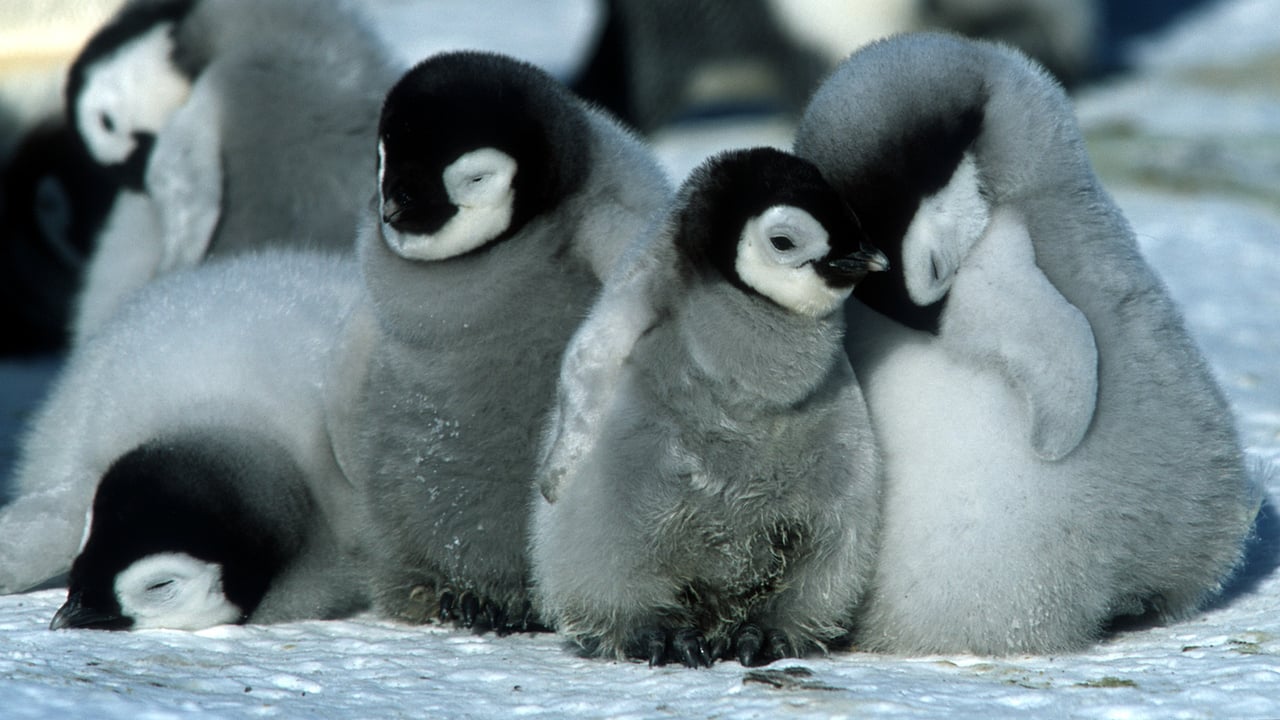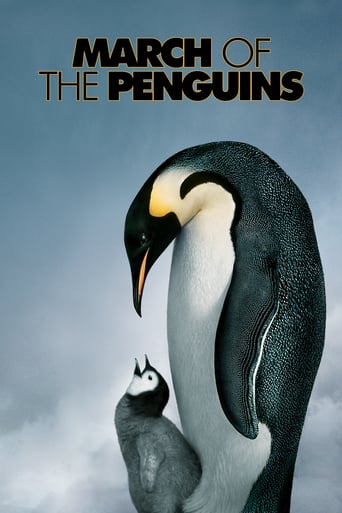

Morgan Freeman narrates the saga of Emperor penguins in the harsh Antarctica landscape to mate, breed and raise junior penguins. A ritual that has been carried on for centuries as Emperor penguins make a great march to the same place each year with solid ice and a bit of cover from ice cold temperatures and blustery wind. All to procreate and endure the hardship of their wilderness as well as seeking to avoid predators.This documentary has amazing photography which is a delight to watch but I felt I wanted to know something more about the penguins and why they carry out this savage journey of 70 miles each year.The film also makes the mistake of making penguins out to be cuddly and human-like. They are not, they are birds and behave like birds which aspects of the documentary skates around from. Some of the romantic gloss the filmmakers added was really a bit silly.
... View MoreMorgan Freeman narrates this Luc Jacquet documentary about the emperor penguins. The monogamous couples walk to their traditional breeding grounds where they laid one egg each. The couple carefully balance the egg on one's feet to incubate it while the other goes back to the ocean to feed. They would transfer the egg as each partner goes back. It's a long dark winter as the sea freezes and the distance walked gets further and further. The mass of penguins huddle against the cold while their partners hunt for fish avoiding deadly seals. It's an epic of parenthood in nature. The story is touching although it may be too humanized. It doesn't as much eat or be eaten as most other nature film. For some reason, Freeman's narrations threw me off. It's never not Freeman and it's harder to get lost in the penguins. Overall, this is a good nature film.
... View MoreFascinating and beautifully made documentary narrated by actor Morgan Freeman shows the migratory journey of a colony of emperor penguins at the south pole who must make the 70-mile trek from their shores inland in order to get to the mating grounds, where they face even more hardships, as it is the mothers who must make the return journey to the water in order to find food(evading waiting predators), and the fathers who stay behind to take care of their egg by concealing them under a flap of furry skin to shield them from the blistering cold, while they face starvation themselves. Even after the eggs are hatched(not all will survive) they face threats from predators and continued freezing weather, as they live in the harshest climate on Earth... A real achievement in filmmaking will resonate most with animal lovers, but will still appeal to all in fine family entertainment.
... View MoreThe March of the Penguins is an Academy Award winning documentary that tracks the voyage of the Emperor Penguin as they make their way to and from the ocean to their breeding ground. It is a remarkable tale of the continuation of a species. A theme throughout the film is that of the awe inspiring love of a parent to a child. No matter the species, the gift of life is a marvel and a thing to be cherished. The Emperor Penguins go through great trials in order to bring about the hatching of their young. They must travel many miles in harsh conditions to reach the breeding ground where they can safely lay their single egg. The father penguins must survive months with no food, huddled together to provide warmth to each other and protection to their eggs. Each father is responsible for the egg he harbors on his feet, beneath a fold of warm skin, while the mothers must make the trek back to the ocean in order to feed themselves and bring food back for their babies. The penguins must struggle against the elements, predators, and starvation. They struggle through these things, all in the hopes of a successful hatching.Morgan Freeman is the only human voice heard throughout the duration of the film. He expertly provides the narration needed to understand the movements of the penguins, and assists the viewer in understanding the harshness of Antarctica and the trials that the penguins go through. He provides interesting facts and details about Emperor Penguins that create a bond with the penguins, such as the fact that Emperor Penguins are monogamous, but only for the season. The March of the Penguins is similar to the 2007 documentary Artic Tale. Both movies focus of the lives of animal parents and their young as they struggle to live in the coldest parts of the world. Both show the trials that the animals face to ensure their survival and the possibility of future generations.The voyage of the penguins comes alive with the capabilities of the camera crew. Much of the film is shot from a subjective, eye level height. This really lets the viewer feel like they are in with the penguins and experiencing the harshness of the weather and the joy of the eggs hatching. Often, the camera zooms in on the penguins so the viewer can appreciate the beauty of the penguins and their surroundings. The camera takes a different angle when the long journey to and from the breeding ground is shown. In this case, it's more of an objective view looking down of the penguins as they make their single file march. The view scans out to see the vastness of the icy landscape and the extreme distance they must travel, all in order to create a new generation.Sound is also a key technique in establishing the bond between parent penguins and their young chicks. Before the father penguins leave the young chicks in their mother's care to head back to the ocean to feed after a four month fast, they sing to their babies and their babies sing back to them. This is the only way that they will recognize each other upon the father's return. It is amazing upon the fathers return, that through the chaos of all the penguins singing that each father can find what he is looking for, his chick. In the coldest place on earth, life remains. The Emperor Penguins continue to struggle and survive in order to create the greatest joy in life, a new life. Everything they do is for the benefit of their young chick. A parent's love can withstand harsh weather, fierce predators, and stress to their bodies in order to create a future for their children. The cycle of life continues.
... View More